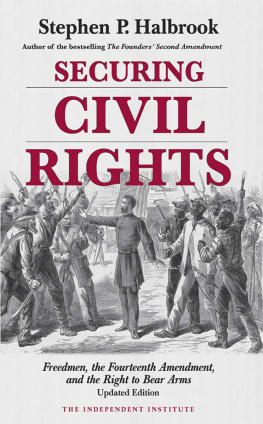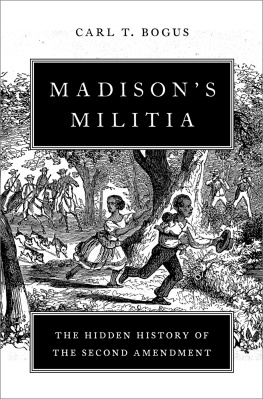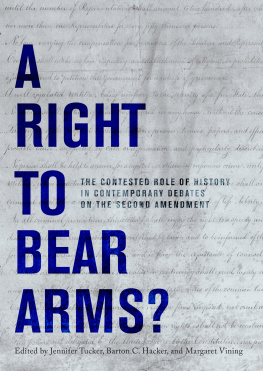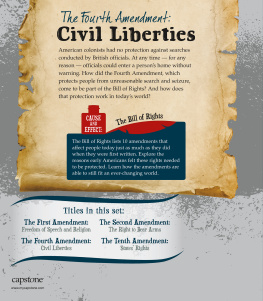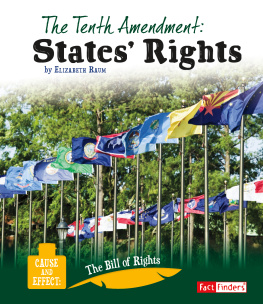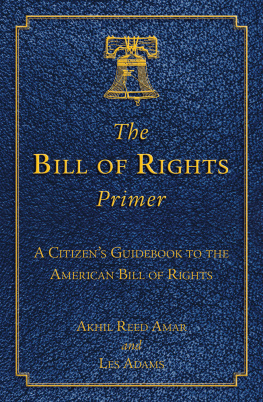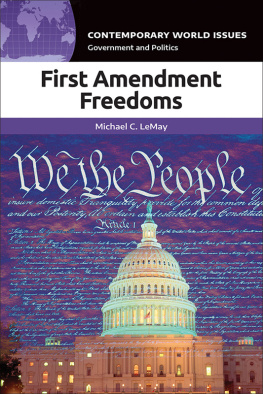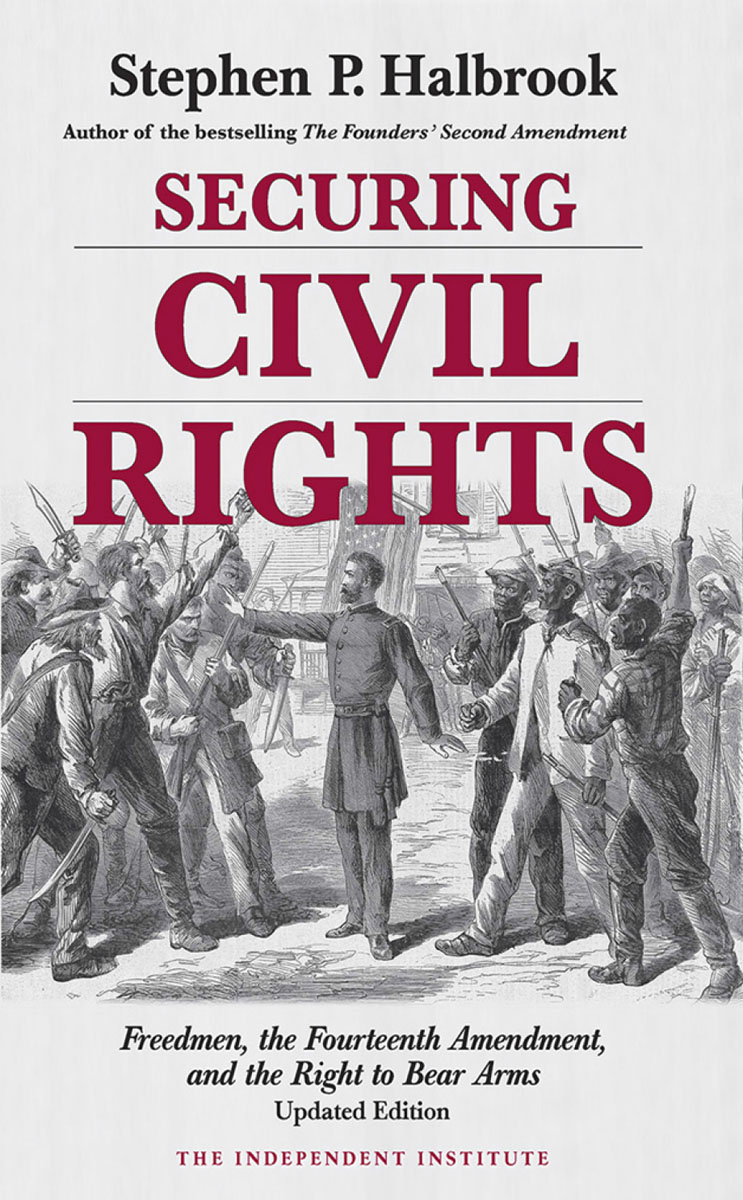
Praise for Securing Civil Rights
In the aftermath of the Civil War, there was an outpouring of discussion of the Second Amendment in Congress and in public discourse, as people debated whether and how to secure constitutional rights for newly free slaves. See generally S. Halbrook, [Securing Civil Rights:] Freedmen, the Fourteenth Amendment, and the Right to Bear Arms, 18661876.
ANTONIN G. SCALIA, Associate Justice, U.S. Supreme Court, in District of Columbia v. Heller
Halbrooks [Securing Civil Rights] touches two hotly contested issues in American constitutional history. It is a contribution to both the Second Amendment debate and the incorporation controversy over the extent the Fourteenth Amendment applies the Bill of Rights, and especially the right to bear arms, to the states. This book is Halbrooks continuation of his previous work on these themes, and he makes an important contribution to the discussions. He properly reminds us that any understanding of the Fourteenth Amendment and the original intensions of its drafters and ratifiers must be achieved through an examination of the debates surrounding contemporary legislation, in particular the Civil Rights Act of 1866 and the Freedmens Bureau Act passed the same year. Private arms provided a way for former slaves to resist forced subjugation. Blacks knew this political calculus as well as both their adversaries in the Ku Klux Klan and their champions in Congress and the Executive Branch. Halbrook has written a book that contributes significantly to our understanding of the linkage between the Second and Fourteenth Amendments. Although his primary concern has been to bring back the Second Amendment from a moribund state in American jurisprudence, Halbrooks efforts also shed considerable additional light on broader questions.
JOURNAL OF SOUTHERN HISTORY
[Securing Civil Rights] is the first to address in detail the issue of whether the framers of the Fourteenth Amendment intended to compel the states to respect Bill of Rights guarantees, especially those of the Second Amendment involving the right to keep and bear arms. In a well-argued narrative, Halbrook follows especially closely Congressional discussion of key Reconstruction-era legislation during 1866 (the Civil Rights Bill, the Freedmens Bureau Bill, and the Fourteenth Amendment) and the Civil Rights Act of 1871. In so doing, he concludes that Congress did indeed intend to extend, as later accepted by the Supreme Court under the incorporation doctrine, Bill of Rights guarantees to the states. This was especially the case, he argues, with the Second Amendment; the willingness of the Congress to trust ex-slaves to own firearms for their protection, in fact, represented the cutting edge of true belief in civil rights. In his thorough analysis of Congressional debates Halbrook makes quite clear the point that the framers of the Fourteenth Amendment saw Second Amendment guarantees as essential to the political liberty of the individual American citizen.
AMERICAN JOURNAL OF LEGAL HISTORY
The aim of the Fourteenth Amendmentto protect the privileges and immunities guaranteed by the Bill of Rights from state encroachmentwas almost immediately hijacked by a perverse, ahistorical Supreme Court ruling. While judges felt obliged to respect the ensuing string of skewed precedents, and lawyers eventually found other ways to achieve the original purpose, an effort has been underway to recover the historical purpose. Stephen Halbrooks book is a part of that effort. His purpose is precise and, in its own way, skewedto demonstrate that the Fourteenth Amendment was meant to incorporate the Second Amendment about which he has written so much, and that the Second Amendment was understood to protect an individual right to be armed. Halbrook assuredly achieves his goal. He provides overwhelming evidence that the Fourteenth Amendment was meant to protect the right of individuals to be armed and that this particular right was a major concern of its framers. He offers scholars in the field a wealth of quotations from the historical debates. He includes an interesting account of southern conventions, and an excellent account of the events leading up to the landmark Cruikshank case which, he believes, heralded the end of Reconstruction. Above all, Halbrook helps restore the historical record of a badly served constitutional amendment.
AMERICAN HISTORICAL REVIEW
The Heller Court also analyzed post-Civil War case law and commentary to conclude a key purpose of the Fourteenth Amendment was to ensure freed blacks had the right to keep and bear arms. Id. at 281011; see generally Stephen P. Halbrook, [Securing Civil Rights:] Freedmen, the Fourteenth Amendment, and the Right to Bear Arms, 18661876 (1998, 2010).
RICHARD B. SANDERS, Justice, Supreme Court of the State of Washington, in State of Washington v. Christopher William Sieyes
Halbrook is a meticulous scholar, and this book definitely answers the question of whether the Fourteenth Amendment was intended to make the Second Amendment into a limit on state and local government. The immediate goal of the Fourteenth Amendments sponsors was to protect southern blacks, most of them recently emancipated slaves, in the aftermath of the Civil War. But in the first three decades after the Fourteenth Amendment was ratified, a divided Supreme Court refused to apply any of the Bill of Rights to the states. The Court majority essentially nullified the Privileges and Immunities clause of the Fourteenth Amendment. As Justice Hugo Black pointed out, and as Halbrook details, there is an immense body of historical evidence that shows that the principal authors of the Fourteenth AmendmentRep. John Bingham and Senator Jacob M. Howardintended it to provide full incorporation. Halbrooks book demonstrates that many proponents and opponents clearly understood that the Fourteenth Amendment would impose the first eight amendments as limitations on the states. Halbrook does an impressive job of gathering evidence not only from the speeches of Bingham and Howard before, during, and after ratification of the Fourteenth Amendment, but from a variety of other members of Congress, from newspaper coverage, and from law books of the day.
NATIONAL REVIEW

Securing Civil Rights was originally published with the title Freedmen, The Fourteenth Amendment, and the Right to Bear Arms, 18661876.


INDEPENDENT INSTITUTE is a non-profit, non-partisan, public-policy research and educational organization that shapes ideas into profound and lasting impact. The mission of Independent is to boldly advance peaceful, prosperous, and free societies grounded in a commitment to human worth and dignity. Applying independent thinking to issues that matter, we create transformational ideas for todays most pressing social and economic challenges. The results of this work are published as books, our quarterly journal, The Independent Review, and other publications and form the basis for numerous conference and media programs. By connecting these ideas with organizations and networks, we seek to inspire action that can unleash an era of unparalleled human flourishing at home and around the globe.
Next page
